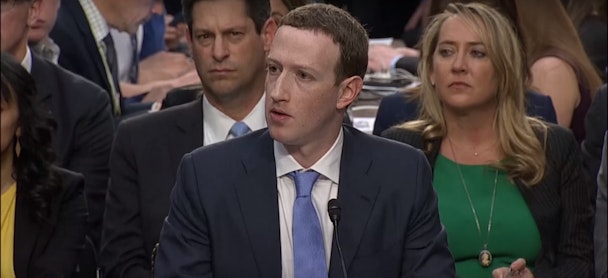Despite ad boycott, monopoly probe and a pandemic, Facebook revenue grows 11%
Facebook had a slow quarter but there was a feeling of triumph emanating from the social networking giant. In the context of one of the worst economic periods of modern times, its 11% revenue growth gave it plenty to cheer. It may just catch the attention of a vigilant congress probing tech monopolies, however.

Despite boycott, monopoly probe and a pandemic, Facebook revenue still grows 11%
The Drum has pulled out the key findings from the Q2 earnings call, including why the high-profile advertiser boycott is having only a negligible effect on its business.
The figures
-
3.14 billion monthly users across all apps (Facebook, Messenger, WhatsApp, Instagram) – up 0.15bn in the quarter.
-
Daily Active Facebook Users (DAU): 1.79 billion.
-
Monthly active users (MAU): 2.7 billion.
-
+12% annual growth in DAU and MAU.
-
Revenue: $18.7bn (+11% year on year).
-
More than 180m businesses “use its tools”.
-
More than 9 million “active advertisers”.
-
Just 1,100 boycotters, though they do include some of the world’s largest brands.
The boycott
-
More than 1,100 advertisers boycotted Facebook in July in protest over its hate speech and misinformation policies. However, the top 100 advertisers make up less than 20% of Facebook’s ad revenue.
-
It was a monumental effort with huge advertisers on board. But the campaign only scraped the tip of the iceberg, and couldn’t rally the small businesses reliant on Facebook. As per Socialbakers research, small companies spent only 21% less on ads during this period.
-
The boycott was cited as one of the reasons, along with the pandemic downturn, for revenue growth slowing but chief executive Zuckerberg announced early in the call that it has almost 9 million active advertisers are using Facebook.
-
"Some also seem to wrongly assume that our business is dependent on a few large advertisers," chief exec Mark Zuckerberg said on a call with investors. "The biggest part of our business is serving small businesses."
-
The latest comments indicate that the Facebook boss remains unruffled by the advertiser revolt, having previously said in July: “My guess is that all these advertisers will be back on the platform soon enough"
-
Sheryl Sandberg, chief operating officer, took questions on the boycott, saying: “It's an interesting situation we find ourselves in because I think oftentimes when companies are boycotted, it's because they don't agree with what the boycotters want. And that's not true at all here. We completely agree that we don't want hate on our platforms, and we stand firmly against it. We don't benefit from hate speech. We never have. Users don't want to see it. Advertisers don't want to be associated with it.”
-
Zuckerberg announced that there will be two new pushes for small business, Facebook Shops and in-messenger commerce. “This really is primarily focused on small businesses, individual entrepreneurs. Small businesses are the biggest part of our business, not the large businesses.”
Congress Probe
-
The call was delayed by one day due to congressional lawmakers probing top tech giants to investigate monopolies in the US.
-
Facebook is currently facing intense political and regulatory scrutiny. The fact that revenue grew, despite so much economic adversity, may not help Facebook convince Congress it doesn’t have a choke hold on the digital ecosystem.
-
Lawmakers looked at efforts to muscle rival apps like Snap and commented that the Facebook acquisition of Instagram "should never have happened".
Covid-19
-
Zuckerberg said: “Since Covid-19 emerged, people have used our services to stay in touch with friends and family who they can't be with in person and to keep their businesses running online even when physical stores are closed.”
-
What would a pandemic have looked like two decades ago without services like Facebook (and its suite of messaging apps), he asked: "Sheltering in place is incredibly disruptive now, but until recently, it would have meant almost no connection with your friends in the broader economy. Most of the small businesses whose storefronts had to close would have gone under, and there wouldn't have been another infrastructure like the Internet that they can move quickly to in order to stay afloat.”
-
Sandberg offered a break down of the period: “After seeing flat year-over-year revenue growth in the first few weeks of April, we saw a considerable recovery in May and June.”
Everything else
-
Facebook chief financial officer David Wehner said that he expects user numbers to slip in regions where lockdown restrictions ease.
-
It expects revenue growth for the third quarter of about 10%.
-
Facebook shares rose 5%.
-
Yuval Ben-Itzhak, chief executive of Socialbakers, said: “Facebook may have taken a beating on the PR front this year, culminating with the #StopHateforProfit movement in July but it’s encouraging to see that their Q2 results remain strong. Likely, most of the fluctuations in ad spend have been on the part of large, global companies. These brands may have high profiles, but they actually account for a relatively small portion of Facebook’s advertising revenue compared to smaller businesses."
-
"No other platform can offer brands and advertisers the reach and scale that Facebook can offer," Ben-Itzhak continued. "As long as Facebook and its family of applications continues to attract users, their advertising business is likely to remain strong. With both daily active user and monthly active users up, Facebook is still attracting new audiences – and advertisers need to be where the users are."
-
It is hard to think about what could slow things down for Facebook short of a server meltdown that bricks its apps and services. Regardless, recently The Drum envisioned where media spend would go if Facebook simply disappeared. There was little agreement on destinations - or whether anything would actually be better.

